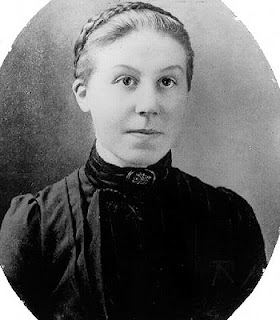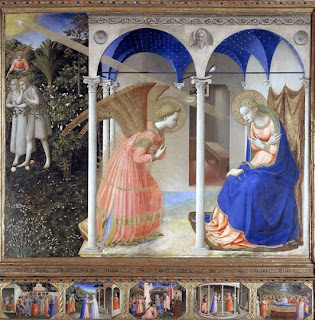One of my blog-readers asked me what my thoughts were about St Mary of the Cross - "What is the Anglican view of saints?" she asked.
Well Hagiography was never my strong suit, and coming from little non-conformist Christian group into the Anglican church only a few years ago, I perhaps am not really qualified to speak about the topic.
The Roman Catholic Church clearly has everything to do with Saints very much under control. They are quite happy for all believers generally to be referred to as saints as made clear in the Bible, and when referring to the Communion of Saints understand that all those we love who have gone before us belong there and that we will one day join them.
They also allow for the possibility that those who die for their faith - as martyrs - will be immediately elevated into the highest place of presence with God and so are Saints and most valuable intercessors on our behalf to Almighty God.
There are some heroes of the faith in particular geographical areas who lives have been so significant that the are declared to be Blessed and as such a "local saints" for that region. For some time Mary MacKillop was referred to as the Blessed Mary - she had been Beatified and was Australia's local saint.

But a special next step was required for her to become a specifically honoured Saint for the whole of the Church. On the basis of the verification of two miracles of healing that were the result of requests in prayer to Mary to intercede with God to bring about healing, Mary was not only Beatified, but also Canonised and made a saint for all the church. These healing miracles demonstrated the power of Mary's intercessions and indicated her closeness to the Almighty. So now she is to be referred to as St Mary of the Cross.
I know that many protestants have difficulty with many aspects of this business and some even dismiss it as "Popeish" thereby relegating it to irrelevancy at best or heresy at worst. One of the biggist sticking points is praying to the Saints asking them to intercede for us. "We only pray in Jesus' Name. Going directly to him avoids the need for the intercession of Saints."
When I joined the Anglican Church some 15 years a dear priest friend helped out with the idea of praying to saints with a very simple analogy as well as clear theological reasoning. “What happens when you die?” he asked. Well, I suppose you go to be with God. “You believe in life after death?” he asked. Yes of course. “so when someone dies they are still alive, with God?” That’s right. “So, when you are worried about something, do you ask your friends to pray for you?” Of course, silly! “Why not ask your friends who have gone before you to God – died, that is – to pray for you as well?” That was all I needed.
So it is that Anglicans include prayers of thanks for those who have gone before us in their weekly intercessions, sometimes asking them to pray for us.
However, while Anglicans seem to have no problem with the great company of those who have been "Sainted" by the church over nearly 2000 years, honouring them on set dates each year as in both Catholic and Orthodox traditions, Anglicans seem only involved in the recognition of local Saints, and this being done on a Diocesan or Provincial basis. Here in Western Australia the Rev'd John Wollaston was promulgated in 1984 by the Bishops of Bunbury and North West Australia as well as the Archbishop of Perth as our Provincial local saint.
I don't know why they don't go in for Canonisation, but I am happy to raise my misgivings about the process. The most significant concern I have about the processes by which the Roman Catholic Church determines if a dead Godly person should be venerated as a saint is their very narrow definition of a miracle. It seems, and I might be wrong, that they are only concerned with miracles of healing. If I were to pray to St Mary of the Cross to alleviate my anxiety over my work situation, for example, and if, as a result of her intercession to God on my behalf, I could say that I was much less troubled than I had been before I asked her to pray for me, would that not be just as much a miracle? Or If I had asked her to intercede with God on my behalf so that I might obtain a certain thing or position, and it came about, would that not also be a miracle? The miracle of medical healing may be definitively verifiable, but I think they have simply made it too hard for themselves.
According to the Roman Catholic Church, Canonisation is a double statement – about the life of the person and also about the faith of the people who are alive at this moment. They are as much a part of the canonisation as the person who is being recognised.
When declaring a saint the Church looks at:
1.The life of a person. It looks at what the person did, how she reacted to the events of life, what people wrote and said about her, what she wrote or said herself. For a martyr the Church looks at the death of a person and considers the reason for the death and the circumstances surrounding the death.
2.The question of continuing devotion. When the person died did the people keep the memory alive? Is the person still alive in the faith of the people? Is her life continuing in the people?
I think all of these things can be ascertained without reference to a miracle of healing. What is important is the dynamic of the person’s remembered life in the community of believers today.
I am very glad to honour that saints of the church as dictated by our calendar. I am also inspired by particular saints to whom I pray – St Barnabas is my hero saint because of his nick name “Son of Encouragement” a nick name I aspire to be worthy of myself.






